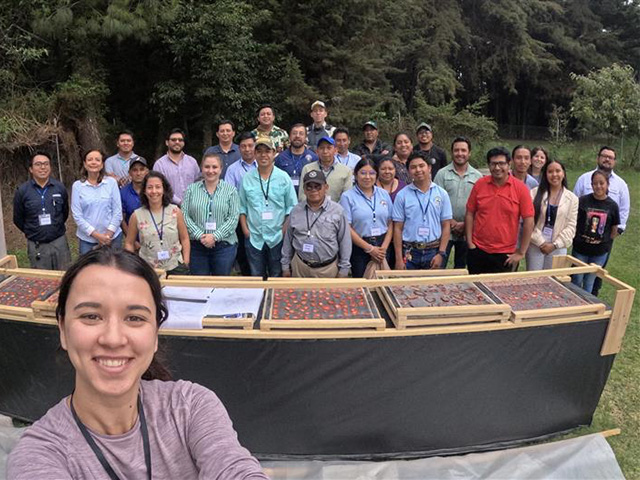Davis, California, USA
June 24, 2024
- The UC Davis Postharvest Research and Extension Center has a fresh new focus, with workshops and resources answering today's questions.
- The center's online bookstore and free, web-based programming continue its national and international reach.
 Undergrad student Dilasha Shenaz assesses quality and mold incidence of table grapes -- the kind of work taken on by the UC Davis Postharvest Research and Extension Center. Shenaz is in the lab of center co-director Bárbara Blanco-Ulate. (Courtesy Bárbara Blanco-Ulate/UC Davis)
Undergrad student Dilasha Shenaz assesses quality and mold incidence of table grapes -- the kind of work taken on by the UC Davis Postharvest Research and Extension Center. Shenaz is in the lab of center co-director Bárbara Blanco-Ulate. (Courtesy Bárbara Blanco-Ulate/UC Davis)
UC Davis has been a leading source of information for people handling, packaging and transporting crops since the beginnings of the Postharvest Research and Extension Center in 1979. Now, the center is strengthening its focus on the needs of industry, offering fresh courses, weaving strategic partnerships and expanding into digital media, all while building up its research capacity to better serve the needs of the produce industry.
“We’re asking people in the industry, ‘How can we support you? How can we better listen to you?’ We want people to know we’re not disconnected know-it-alls,” said new center co-director Bárbara Blanco-Ulate, an associate professor in the UC Davis Department of Plant Sciences. “We’re getting more faculty involvement, people with expertise in related fields such as quality engineering and safety, as well as bringing in emeriti faculty and people from around California. We’re forming partnerships with organizations around the world, and we’ve opened up to people from other institutions around the country.”
“The larger the network, the more things we can do,” added fellow co-director Irwin R. Donis-Gonzalez, an associate professor of UC Cooperative Extension in the Department of Biological and Agricultural Engineering.
The foundation: Expanded research
The new co-directors will beef up the center’s applied science component with the hiring of a research specialist. They aim to provide new information that can be used industry-wide as companies explore new ways to handle and store fresh produce.
“We’re building the capacity to respond to industry requests for research,” Blanco-Ulate said.
 An example of the type of assistance the UC Davis Postharvest Research and Extension Center can offer: In Guatemala, doctoral student Alice Dien trains farmers and scientists on topics related to drying agricultural produce. Dien is a student in the lab of center co-director Irwin Donis-Gonzalez, in the Department of Biological and Agricultural Engineering.
An example of the type of assistance the UC Davis Postharvest Research and Extension Center can offer: In Guatemala, doctoral student Alice Dien trains farmers and scientists on topics related to drying agricultural produce. Dien is a student in the lab of center co-director Irwin Donis-Gonzalez, in the Department of Biological and Agricultural Engineering.
New courses, national reach
Their first workshop, held recently, demonstrates the center’s renewed vision and commitment to broad networking: The Agricultural Water Systems Workshop addressed current concerns around water management and risks to food safety. Partners in the course included the Western Growers Association, the University of Arizona, the University of Florida and Salinas-based Taylor Fresh Foods, Inc.
Courses given over the past several years that have been recorded will be posted to the center’s new, online video library and to the center’s YouTube channel.
“People can watch those courses for free,” Blanco-Ulate said. In addition, new courses will be offered in-person and hybrid.
The co-directors are working with the University of California to offer continuing and professional education credits to course participants.
Online resources – many for free!
 Brightly colored fruit winds along a conveyor belt inside one of the working areas of the UC Davis Postharvest Research and Extension Center. (UC Davis)
Brightly colored fruit winds along a conveyor belt inside one of the working areas of the UC Davis Postharvest Research and Extension Center. (UC Davis)
The center’s website features a database with scores of free product fact sheets, which are downloaded by users around the world. The fact sheets are so highly regarded that they are considered expert evidence in legal proceedings, Blanco-Ulate said. Visitors to the website can also find links to research papers published by UC Davis faculty, including seminal works by Adel Kader, who founded the center.
Books are offered through the center’s online bookstore and include titles through UC Agricultural and Natural Resources. Ten new titles are being planned, including topic-specific updates taken from previous classics.
 Tomatoes are among the many vegetables, fruits and ornamentals supported with information and training through the UC Davis Postharvest Research and Extension Center. (Adrian Sbodio/UC Davis)
Tomatoes are among the many vegetables, fruits and ornamentals supported with information and training through the UC Davis Postharvest Research and Extension Center. (Adrian Sbodio/UC Davis)
Debunking myths: Ethylene
A new newsletter deals with a new problem: Misinformation about food and food handling that spreads through social media. One example is the use of ethylene to ripen produce such as bananas, so that they can be safely stored until ready for the consumer.
“Ethylene is safe for humans and does not leave any harmful residue on produce,” Donis-Gonzalez wrote in the center’s latest newsletter. Even better news, he added: The levels of ethylene used on food are a tiny fraction of the concentrations that would be needed to create an explosion, one of the false alarms being raised in social media.
Evolving with the times
After 47 years of service, these and more updates will keep the center at the forefront of an evolving postharvest world. The top goal: Meet the needs of agriculturalists, industry and consumers.
“We are adapting to new needs, with both the resources and the workshop we’re offering,” Donis-Gonzalez said.
“As a land-grant institution, we take our outreach mission seriously,” Blanco-Ulate added.
Related links
More about the UC Davis Postharvest Research and Extension Center.